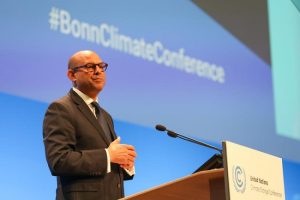In recent years, a global cost-of-living crisis, exacerbated by inflation, has ensnared nations, impacting billions. Sadly, this adversity has become a pawn for some, fostering a divisive narrative that climate action is unaffordable and contrary to the interests of ordinary people.

However, according to Simon Stiell, the UN climate change Executive Secretary, this notion couldn’t be further from the truth.
Stiell emphasises that the Green vs. Poor narrative is a deceptive tactic, often deployed to mask short-term, profit-driven self-interest. The only sustainable future, he contends, involves ensuring energy security, building resilience to disasters, orchestrating coordinated recovery efforts, and capping the rise in temperature at 1.5 degrees Celsius.
Fossil fuels, comprising coal, oil, and gas, significantly contribute to the cost-of-living crisis, placing strain on household budgets globally. Fluctuating prices, fueled by uncertainty and conflict, drive up costs for transportation, food, electricity, and basic necessities. In 2022, fossil fuel energy costs led to a staggering $1000 increase in household bills in heavily dependent countries.
According to economic authorities such as the United States Treasury, the Reserve Bank of India, and the European Central Bank, further consumer cost hikes and slowed economic growth are predicted due to intensified climate impacts. High energy prices not only erode business profit margins and hinder economic growth but also impede global energy access rights, disproportionately affecting the poorest households.
Simultaneously, global climate disasters are on the rise, with this year projected to be the hottest in 125,000 years. Destructive storms, unpredictable rains, floods, heatwaves, and droughts inflict significant economic damage, impacting millions and exacting a toll on lives and livelihoods.
Although abruptly turning off fossil fuel taps is impractical, Stiell asserts that numerous untapped opportunities for action exist. In 2022, governments spent over $7 trillion on fossil fuel subsidies, diverting funds from poverty alleviation, healthcare, and renewable energy infrastructure. Responsible phasing out of these subsidies, he argues, can benefit the poorest and bolster economies.
The recent Global Stocktake on climate action at UN Climate Change unveiled tools to expedite climate action, concurrently strengthening economies. Governments globally are urged to harness these tools, redirecting investments from fossil fuels to renewable energy for stable, reliable, and affordable energy.
COP28 in Dubai offers an optimistic opportunity for governments to cooperate and focus on solutions. Stiell proposes agreements to triple renewable energy capacity, double energy efficiency, and increase finance for climate adaptation as pivotal steps towards climate justice. Fulfilling past promises on financing the transition and outlining future funding plans will shape climate commitments.
While one moment won’t transform everything, Stiell emphasises that COP28 can set the course for the future, providing a plan for national commitments to deliver in 2025. He concludes with a resolute call to action, urging collective rejection of fearmongering in pursuit of a sustainable, just future.
